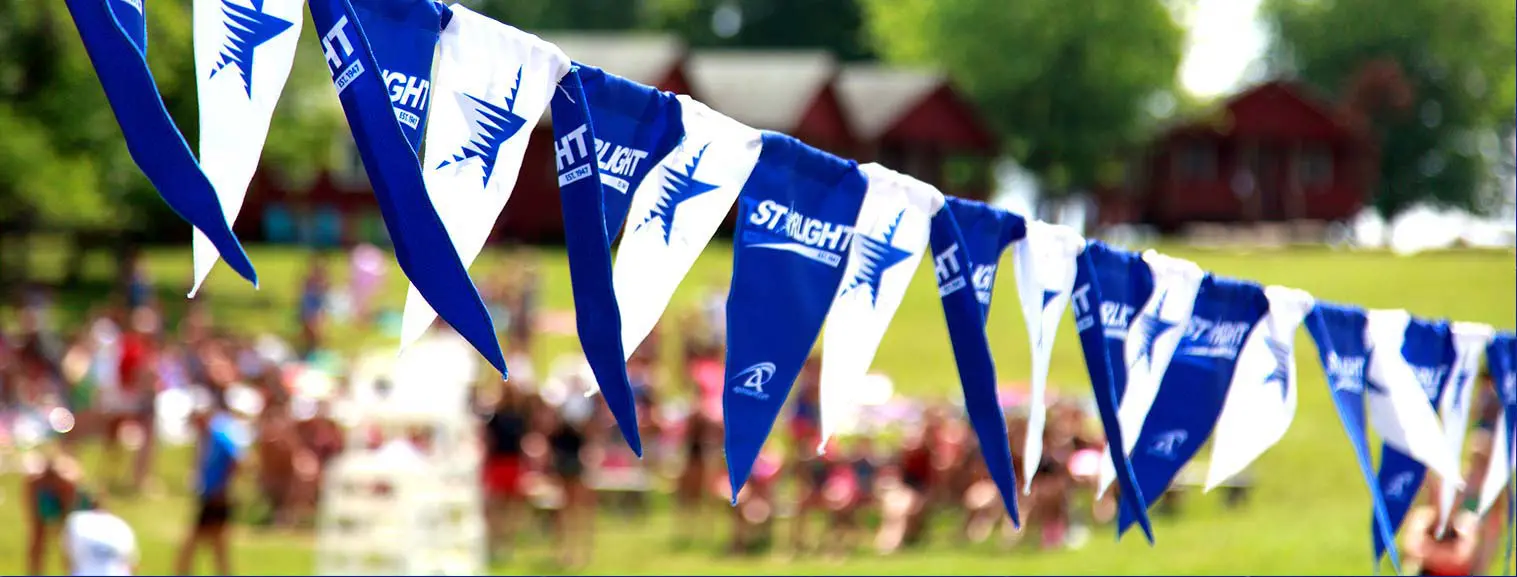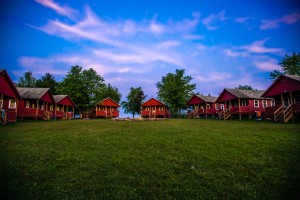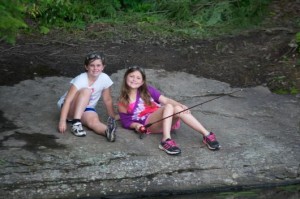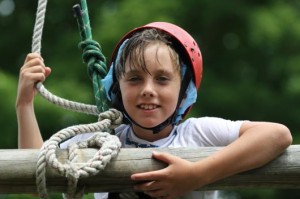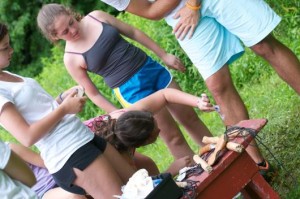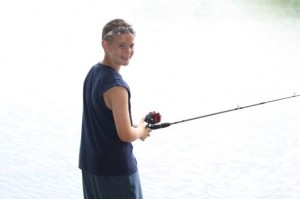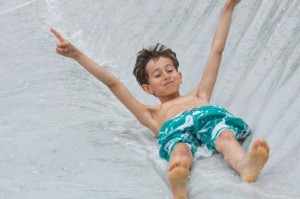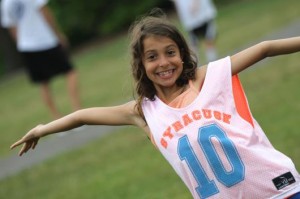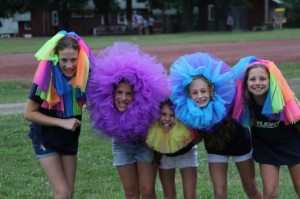 A question about the type of children who go to summer camp recently popped up on an internet parenting debate board. The parent in question was considering sending her daughter to a summer camp but was afraid that she would not fit in. Among those offering an opinion, there were a lot of ideas based on stereotypes that seemed mostly derived from what people had seen in the movies rather than firsthand experience. Interestingly, not one of those people participating in the discussion actually sent their children to summer camp. But they knew someone, who knew someone who did. It was like the six degrees of Kevin Bacon summer camp style. But we do know summer camp. It is our lives, not just every summer but throughout the year, and we can describe firsthand the type of children who go to summer camp. Everyone!
A question about the type of children who go to summer camp recently popped up on an internet parenting debate board. The parent in question was considering sending her daughter to a summer camp but was afraid that she would not fit in. Among those offering an opinion, there were a lot of ideas based on stereotypes that seemed mostly derived from what people had seen in the movies rather than firsthand experience. Interestingly, not one of those people participating in the discussion actually sent their children to summer camp. But they knew someone, who knew someone who did. It was like the six degrees of Kevin Bacon summer camp style. But we do know summer camp. It is our lives, not just every summer but throughout the year, and we can describe firsthand the type of children who go to summer camp. Everyone!
It’s true. There really is not a specific type of child that goes to summer camp. Campers who attend the many thousands of summer camps throughout the United States each year come from all walks of life, countries from around the globe, and have about as many different interests as there are types of camps. Here’s the secret. It is not about being the “type” of child that goes to summer camp. It is about finding the summer camp that is right for your child. Camps throughout the United States cater to different interests, budgets, schedules, religious faiths, just about every variable of which one could imagine. Closer to our own home (and hearts), America’s Finest Summer camps fall more into the traditional summer camp category. They are not strictly sports oriented. In fact, they offer plenty of niche activities. But they, as most traditional summer camps, are still considered “sports camps” because there is a lot of physical recreation. Children are encouraged to be active and enjoy the outdoors. Roughly half of each day at a traditional summer camp is focused on sports related activities. It goes without saying that sending a child who is not interested in sports to a seven or eight week camp with an athletic heavy program is probably not a wise choice.
For those ready to cross traditional camps off of your list because you’re sure your child is not the type of child who goes to a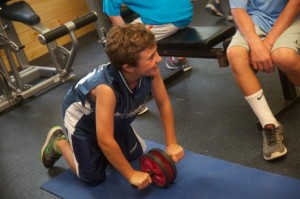 traditional style residential summer camp, consider an alternative that is rapidly rising in popularity before you do: choice oriented summer camp programs. Choice oriented camps are sort of a hybrid between a traditional summer camp and special interest camps. In fact, more and more camps are now making their programs more choice oriented because these types of camps have become so popular with campers and their parents over the past several years. Camps that offer choice programs allow campers to decide which activities they do each day. Choice programs vary in the amount of control given to campers. Some offer schedules that are partially determined by the camp with campers having the opportunity to choose a certain amount of their daily activities. Other camps give campers total control, which means that even if the camp is technically considered a traditional sports related summer camp, campers have the opportunity to determine their level of athletic participation. Camps that offer full choice programs tend to draw a slightly more diverse set of campers than traditional sports camps and are typically a good fit for campers who want the traditional summer camp experience but who have special interests on which they’d prefer to focus.
traditional style residential summer camp, consider an alternative that is rapidly rising in popularity before you do: choice oriented summer camp programs. Choice oriented camps are sort of a hybrid between a traditional summer camp and special interest camps. In fact, more and more camps are now making their programs more choice oriented because these types of camps have become so popular with campers and their parents over the past several years. Camps that offer choice programs allow campers to decide which activities they do each day. Choice programs vary in the amount of control given to campers. Some offer schedules that are partially determined by the camp with campers having the opportunity to choose a certain amount of their daily activities. Other camps give campers total control, which means that even if the camp is technically considered a traditional sports related summer camp, campers have the opportunity to determine their level of athletic participation. Camps that offer full choice programs tend to draw a slightly more diverse set of campers than traditional sports camps and are typically a good fit for campers who want the traditional summer camp experience but who have special interests on which they’d prefer to focus.
The length of the camp is key in determining whether a camp is a good fit for your child. Children who have never spent any time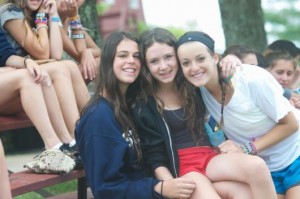 away from home or who have never attended day camp may find a sleepaway camp that lasts the full summer a bit overwhelming. And who could blame them? Imagine being a child who has spent every day of your life in an urban or suburban setting with mom and dad who suddenly finds yourself sleeping in a bunk or cabin with eight or ten other kids and a couple of college age strangers you just met in the middle of the woods. Yep…a bit of a culture shock, and for children who tend to be a bit skittish, shy, or particular about their daily and/or nightly routines, usually not a good one. In fact, most full summer camps recommend and even prefer that new campers attend day camp for a summer or two prior to enrolling for a residential program. For those wanting to test the waters with a sleepaway experience, consider trying a session camp with shorter sessions, usually three or four weeks.
away from home or who have never attended day camp may find a sleepaway camp that lasts the full summer a bit overwhelming. And who could blame them? Imagine being a child who has spent every day of your life in an urban or suburban setting with mom and dad who suddenly finds yourself sleeping in a bunk or cabin with eight or ten other kids and a couple of college age strangers you just met in the middle of the woods. Yep…a bit of a culture shock, and for children who tend to be a bit skittish, shy, or particular about their daily and/or nightly routines, usually not a good one. In fact, most full summer camps recommend and even prefer that new campers attend day camp for a summer or two prior to enrolling for a residential program. For those wanting to test the waters with a sleepaway experience, consider trying a session camp with shorter sessions, usually three or four weeks.
All of this is not to say that there aren’t certain attributes that help a child become acclimated to a summer camp environment faster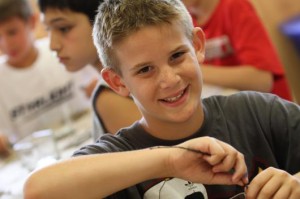 than others. Outgoing, open-minded children who are willing to try just about anything usually get off the bus on their very first arrival day and blend right in as if they’ve been going to summer camp their entire lives. Children who tend to be more reserved may take a bit longer to ease into summer camp life, but the environment of summer camp tends to be one that facilitates acceptance and there are very few types of personalities that don’t eventually hit their stride. Generally, once children meet that special friend or find that favorite activity, self-confidence grows by leaps and bounds and any sort of trepidation they may have had when they arrived is left behind. In that regard, camp can actually be a good experience for those children who could use a little boost in the area of self-confidence.
than others. Outgoing, open-minded children who are willing to try just about anything usually get off the bus on their very first arrival day and blend right in as if they’ve been going to summer camp their entire lives. Children who tend to be more reserved may take a bit longer to ease into summer camp life, but the environment of summer camp tends to be one that facilitates acceptance and there are very few types of personalities that don’t eventually hit their stride. Generally, once children meet that special friend or find that favorite activity, self-confidence grows by leaps and bounds and any sort of trepidation they may have had when they arrived is left behind. In that regard, camp can actually be a good experience for those children who could use a little boost in the area of self-confidence.
So, if you’ve been thinking about sending your children to summer camp but haven’t because, like the parent on the parenting debate forum, you aren’t sure whether your child will fit in, remember that it’s really more about finding the right camp for your child’s personality and preferences. Once you find that, chances are that you’ll also find a group of campers with which your child will fit right in!
 Now that all the snow if FINALLY melting, we can’t stop thinking about our favorite ice cold drink at Camp! The SLUSHIE!
Now that all the snow if FINALLY melting, we can’t stop thinking about our favorite ice cold drink at Camp! The SLUSHIE!


